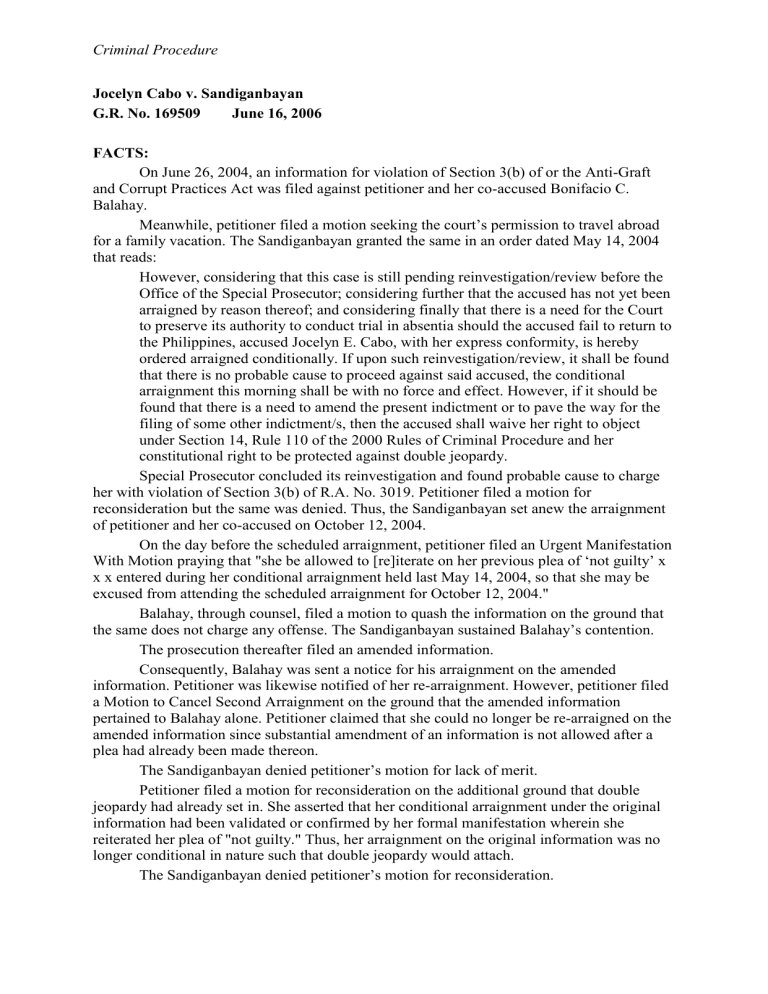
Criminal Procedure Jocelyn Cabo v. Sandiganbayan G.R. No. 169509 June 16, 2006 FACTS: On June 26, 2004, an information for violation of Section 3(b) of or the Anti-Graft and Corrupt Practices Act was filed against petitioner and her co-accused Bonifacio C. Balahay. Meanwhile, petitioner filed a motion seeking the court’s permission to travel abroad for a family vacation. The Sandiganbayan granted the same in an order dated May 14, 2004 that reads: However, considering that this case is still pending reinvestigation/review before the Office of the Special Prosecutor; considering further that the accused has not yet been arraigned by reason thereof; and considering finally that there is a need for the Court to preserve its authority to conduct trial in absentia should the accused fail to return to the Philippines, accused Jocelyn E. Cabo, with her express conformity, is hereby ordered arraigned conditionally. If upon such reinvestigation/review, it shall be found that there is no probable cause to proceed against said accused, the conditional arraignment this morning shall be with no force and effect. However, if it should be found that there is a need to amend the present indictment or to pave the way for the filing of some other indictment/s, then the accused shall waive her right to object under Section 14, Rule 110 of the 2000 Rules of Criminal Procedure and her constitutional right to be protected against double jeopardy. Special Prosecutor concluded its reinvestigation and found probable cause to charge her with violation of Section 3(b) of R.A. No. 3019. Petitioner filed a motion for reconsideration but the same was denied. Thus, the Sandiganbayan set anew the arraignment of petitioner and her co-accused on October 12, 2004. On the day before the scheduled arraignment, petitioner filed an Urgent Manifestation With Motion praying that "she be allowed to [re]iterate on her previous plea of ‘not guilty’ x x x entered during her conditional arraignment held last May 14, 2004, so that she may be excused from attending the scheduled arraignment for October 12, 2004." Balahay, through counsel, filed a motion to quash the information on the ground that the same does not charge any offense. The Sandiganbayan sustained Balahay’s contention. The prosecution thereafter filed an amended information. Consequently, Balahay was sent a notice for his arraignment on the amended information. Petitioner was likewise notified of her re-arraignment. However, petitioner filed a Motion to Cancel Second Arraignment on the ground that the amended information pertained to Balahay alone. Petitioner claimed that she could no longer be re-arraigned on the amended information since substantial amendment of an information is not allowed after a plea had already been made thereon. The Sandiganbayan denied petitioner’s motion for lack of merit. Petitioner filed a motion for reconsideration on the additional ground that double jeopardy had already set in. She asserted that her conditional arraignment under the original information had been validated or confirmed by her formal manifestation wherein she reiterated her plea of "not guilty." Thus, her arraignment on the original information was no longer conditional in nature such that double jeopardy would attach. The Sandiganbayan denied petitioner’s motion for reconsideration. Criminal Procedure ISSUE: Whether double jeopardy has attached RULING: NO. In the case at bar, the Sandiganbayan Order dated May 14, 2004 unequivocally set forth the conditions for petitioner’s arraignment pending reinvestigation of the case as well as her travel abroad. Among the conditions specified in said order is "if it should be found that there is a need to amend the present indictment x x x, then the accused shall waive her right to object under Section 14, Rule 110 of the 2000 Rules of Criminal Procedure and her constitutional right to be protected against double jeopardy." Petitioner was duly assisted by counsel during the conditional arraignment and was presumably apprised of the legal consequences of such conditions. In fact, she signed the minutes of the proceedings which could only signify her informed acceptance of and conformity with the terms of the conditional arraignment. Thus, petitioner cannot now be allowed to turn her back on such conditions on the pretext that she affirmed her conditional arraignment by means of a written manifestation. To begin with, there is no showing that the Sandiganbayan ruled on her written manifestation and motion that she be allowed to merely confirm her previous plea on the original information. It is likewise doubtful that petitioner may legally confirm her conditional arraignment by means of a mere written motion or manifestation. Section 1(b), Rule 116 of the Rules of Court explicitly requires that "(t)he accused must be present at the arraignment and must personally enter his plea." At any rate, with or without a valid plea, still petitioner cannot rely upon the principle of double jeopardy to avoid arraignment on the amended information. It is elementary that for double jeopardy to attach, the case against the accused must have been dismissed or otherwise terminated without his express consent by a court of competent jurisdiction, upon a valid information sufficient in form and substance and the accused pleaded to the charge.25 In the instant case, the original information to which petitioner entered a plea of "not guilty" was neither valid nor sufficient to sustain a conviction, and the criminal case was also neither dismissed nor terminated. Double jeopardy could not, therefore, attach even if petitioner is assumed to have been unconditionally arraigned on the original charge. It should be noted that the previous information in Criminal Case No. 27959 failed to allege all the essential elements of violation of Section 3(b), R.A. No. 3019. It, in fact, did not charge any offense and was, to all intents and purposes, void and defective. A valid conviction cannot be sustained on the basis of such information. Petitioner was resultantly not placed in danger of being convicted when she entered her plea of "not guilty" to the insufficient indictment.

